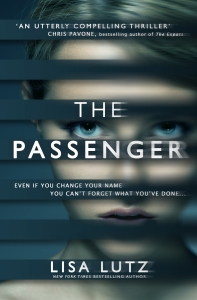The Intel: Lisa Lutz
 You know Lisa Lutz - she’s the bestselling author of The Spellman books, about a family of private investigators. But Lisa’s latest novel The Passenger is a different beast altogether. It’s a dark, twisty tale about identity in which a woman goes on the run after her husband dies in an accident.
You know Lisa Lutz - she’s the bestselling author of The Spellman books, about a family of private investigators. But Lisa’s latest novel The Passenger is a different beast altogether. It’s a dark, twisty tale about identity in which a woman goes on the run after her husband dies in an accident.
Tanya DuBois isn’t real, and neither is Amelia Keen, Debra Maze, or any of her other aliases. She is Amelia when she meets Blue, another woman with a life she’d rather not discuss, and thinks she’s found her kindred spirit. But their pasts and futures clash as the body count rises around them…
In this intel interview, Lisa talks about her startling new heroine, the Spellmans and about going off the grid.
She also talks about her so-called failed screenwriting career which began and ended with a mob comedy called Plan B. But wait… all is not as it seems. Since she answered our intel questions it’s been ann0unced that Lisa will be joining Megan Abbott, George Pelecanos and Richard Price as one of the scriptwriters on David Simon’s new HBO drama, The Deuce, set in the porn industry in the 1970s.
Who is The Passenger?
The passenger is the narrator of my novel. It also refers to the role she’s playing in her own life.
We’ll call her Tanya, but she goes by many names in the book. At first, all we know about her is that she’s running from something.
Where did you get the inspiration for Tanya DuBois?
I was interested in writing a novel about a woman who changes from one identity to the next. I liked the idea of her character being layered with other characters—who were still part of her—and the effect her near and distant pasts have had on her life.
If you ever changed your identity and tried to fly away from your troubles, how far do you think you would get?
I think I’d get farther than most. Or least I’d stay hidden longer. I’m afraid I can’t provide any more details. I wouldn’t want to blow my future cover.
 The Passenger is a change of pace from The Spellman books – did you consciously set out to write something darker and grittier?
The Passenger is a change of pace from The Spellman books – did you consciously set out to write something darker and grittier?
It was never my plan to write only in the style of the Spellman series. When I finished The Spellman Files over ten years ago, I immediately began writing a totally different kind of book (published as How to Start a Fire just last year). But the publisher asked if I had a Spellman sequel in me, and I did. Five books later, I knew it was time for me to move on.
I wasn’t necessarily interested in writing something darker—there are some very dark themes in all of my books. I was simply interested in writing a different kind of story. I had other subjects I wanted to explore.
You’ve described yourself as a ‘failed screenwriter’ – how did your experiences in Hollywood lead to your becoming a novelist?
I wrote screenplays for ten years; it never even occurred to me to write a novel. Mostly I wrote one screenplay over and over again. It was a mob comedy called Plan B that got made in 2000. Let’s just say after that it was hard to get anyone to read my scripts. I wrote The Spellman Files out of desperation, really. But it was the smartest thing I ever did.
I don’t think of myself as a failed screenwriter anymore. I’m a novelist. There’s nothing else I’d rather do.
What’s the hardest lesson you ever had to learn about writing?
Just a few days ago I decided to put aside the book I’m working on to start something else, which is what I should have been writing all along. I didn’t pay attention to what I was most passionate about and instead made a calculated decision that I now regret. Never write what you think you should write; write what you’re most passionate about.
Who are the authors you admire, and why?
There are so many, but since I just finished reading Megan Abbott’s upcoming You Will Know Me, I’ll start with her. Her writing is so elegant and her stories so cutting and insightful. I’m a huge fan of Laura Lippman because, well, she’s great, but I also admire how she does something very different each time with her standalones. I loved every second of Maria Semple’s hilarious Where’d You Go, Bernadette. On an opposite note, I felt deeply connected to Claire Messud’s The Woman Upstairs, which came out a few years ago.
Give me some advice about writing…
There’s a line in Barton Fink where the studio producer says to Barton, ‘We all have that Barton Fink feeling, but since you’re Barton Fink I’m assuming you have it in spades.’ Don’t try to emulate other writers. Figure out what you’re about and who you are.
What’s next for you?
I’m starting research on that book I should have been working on all along, and I’ve got a few other things on the burner.
***
The Passenger, published by Titan Books, is out right now in paperback and ebook.

